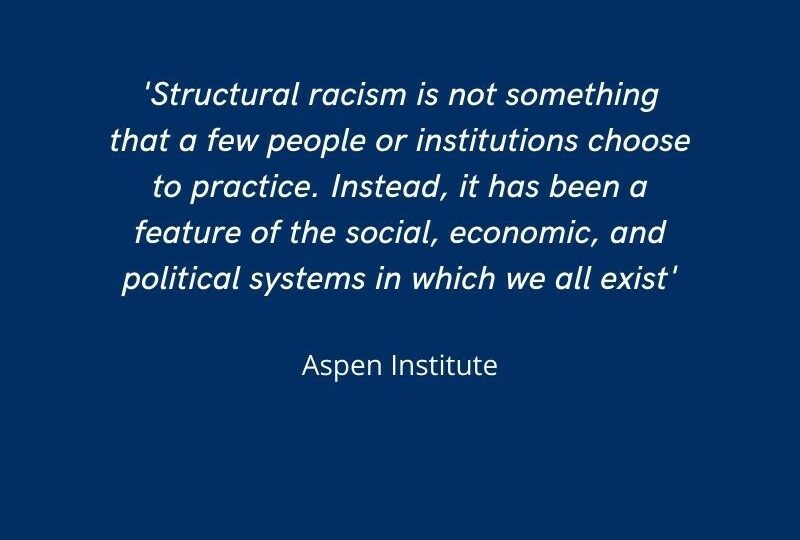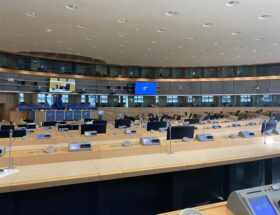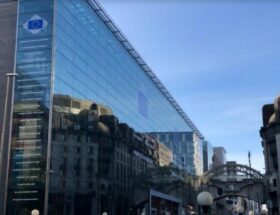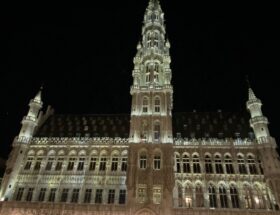‘In 2020, systemic racism became a worldwide issue that caused multiple conversations of how to combat it. The EU Commission has drafted a five-year plan to help with the issue’
By Gabrielle Bunton for (E)quality of Life on December 14, 2021
BELGIUM
This year will mark 40 years since the national Anti-Racism Act was passed in Belgium. While the legislation does hold good intentions, what has occurred within the country says otherwise.
Belgium native, Mouhad Reghif grown up with his father working a blue-collar job, poor with French, and didn’t have a school education. Despite his father’s setbacks, he always worked hard and wanted his kids to do great things, such as getting an education. His father believed heavily in the school system.
With the encouragement of his father, Reghif would learn the French language, go to school, and excel. But when he was 15, he started to have trouble in school to the point where he was sent off and had to find a new school to continue his education. During this time, he noted that his father couldn’t do much for him. He didn’t know his rights, but he was completely confident in the school system.
“… my father couldn’t do anything for me because he didn’t know his rights. He couldn’t speak the language. He was confident in the school system. He didn’t think that school could be racist and go against me,” said Reghif .

Reghif is Moroccan. His race was something he didn’t see as an issue until he went to school where he noticed that the white students were able tot get away with more things when it came to their behaviour, but for him when it came to asking questions he was met backfire.
20 years later the same thing would happen to his 14-year-old daughter. The reasoning: she put too much psychological pressure on the teachers, so they couldn’t teach her any longer. Much like his father, he fought to keep her in the school to continue her education.
“I knew the system. I knew the rules and laws. I had the money. I tried to fight for her to stay at the school because she had been there since she was two. I tried to handle it eternally, but it didn’t work. We went to work with five lawyers, and they refused to help us. In the end, she was sent off like I was,” said Reghif.
To him, the system had not only shown its true colours but also shown how minorities are treated differently within the system. Reghif has used those incidents as fuel for his activism. He is now a spokesman for the Brussels Panthers, an anti-racist organization in Belgium that focuses on being politically anti-racist and systemic racism.
They try to educate people through what they post, but their focus is going to the systems and trying to make a change. One of their most notable accomplishments was bringing awareness to Ducasse d’Ath, Ath, Belgium where a character known as ‘The Savage’ is played by a white person doing black face, chains on hand and ankles, piercings, and more.
They then wrote a letter about the mayor and started a petition to The United Nations Educational, Scientific and Cultural Organization (UNESCO) to withdraw their recognition of the festival.
Their effort had drawn attention around the world with help from media outlets like the New York Times which eventually led to the cancellation of it in 2018. Reghif says it’s a small accomplishment, but more work needs to be done.
The brutal colonial past with the Democratic Republic of Congo has also been at the forefront of demonstrations and conversations regarding systemic racism and racism in the country. The past still haunts the country today, as reported by Alexandra Brzozowski for EURACTIV, complaints of racism rose by almost 50% in 2020.
For Reghif, he thinks the system makes things racist. He explains that many legislation’s are being made by older white men who have never experienced racism and/or never experienced it.
“If you ask all of them what racism is, they don’t know what it is. So how can you fix a problem that you have never experienced or heard of in your life,” said Reghif. “The state is not racist, but they do produce state racism. They cannot be the problem and solution at the same time.”

STRUCTURAL RACISM
Systemic or Structural Racism is defined as a system in which public policies, institutional practices, cultural representations, and other norms work in various, often reinforcing ways to perpetuate racial group inequity.
Pamela Evbuomwan, Social Media Content Manager for Black Speaks Back, says that Belgians are afraid of being called racist, so they don’t acknowledge it.
“The system is what makes people the way they are. If they see the system treating Black people and others badly, they will do the same because they know they can get away with it. They think ‘oh it’s an American thing, we’re not like that but they are like that. They just don’t show it that much,” said Evbuomwan.
Black Speak Back is a media platform in Belgium that focuses on creating content with diverse and under-represented narratives of Afro-descendants in Belgium and the Netherlands. With their efforts, they put out various forms of content like video essays and films to show a positive light on the experiences, culture, and politics regarding the Afro-diaspora in Belgium and The Netherlands.

(Pictured is Pamela Evbuomwan, Social Media Content Manager for Black Speaks Back// CREDIT: Pamela Evbuomwan)
DENMARK
Activist and creator of Black Lives Matter Denmark, Bwayla Sorensen said systemic racism is prevalent across Europe and the system upholds a racist mindset about minorities.
“The narrative is that the Black and brown people are dangerous. It’s throughout the member states. It’s a business. There’s money behind capitalism, the narrative, and political power. They have to keep that to uphold white supremacy,” said Sorensen.
A year ago, Sorensen had worked closely with the family of Philip Mbuji Johansen, a bi-racial man who was beaten to death at the hands of two white brothers Mads and Magnus Møller on the Danish island, Bornholm.
His body was found the next morning and the brothers confessed to the killing and said that they never intended to kill him. It was immediately not ruled a hate crime despite Mads Møller, the eldest brother, having swastika and white power tattoos. Magnus Møller also told police when he was arrested that he held Johansen down by putting a knee on his neck. They were found guilty of his murder and sentenced to 14 years in jail.
Sorensen said she watched people of the media cover the murder with no mentions of the swastika tattoos of the brothers, the suffering of Johansen, or anything regarding racism.
“That’s the media being racist. They left out key things that mattered in the case. The media and the whole case were structural racism all the way. This was a lesson that we learned to speak up,” said Sorensen. “The media in all aspects needs to be honest. If you don’t do that you hurt a certain group of people and uphold another. Things will never get better if they keep doing this.”

(Pictured is Bwayla Sorensen, activist and creator of Black Lives Matter Denmark// CREDIT: Naderah Parwani.)
For her, a step in the right direction to combat systemic racism would be for Denmark and other European countries to acknowledge their pasts and see how it affects the people of colour within the communities.
“They [Denmark] need to acknowledge their past. They had their hands in the slave trade. They have colonized and done a lot of things towards not only Black people, but Muslims, Asians, and other people of colour. To fix the problem, we must confront the ugliness of it all. Other than that, we will continue to see the system fail us and we will continue to keep quiet about the things that hurt us,” said Sorensen.
EU ANTI-RACISM ACTION PLAN 2020-2025
With 2020 being a year of racial reckoning, the EU Commission developed the EU Anti-Racism Action Plan 2020-2025 to tackle structural racism within the member states.
“We all need to do better. The Commission presented an ambitious EU anti-racism plan with several measures to be taken at the EU and national level,” said a Commission official.
In section three, Structural racism – tackling the underlying problem, it states that ‘As the impact of structural racism can be as profound and harmful as individual racism, its existence needs to be acknowledged and it must be addressed through proactive policies.’
The plan encourages an intersection perspective, which will deepen the understanding of structural racism and make the responses to it more effective. The first subsection talks about raising awareness of history and combating stereotypes. The second thing is to create inclusive media outlets with positive narratives and increase the knowledge and awareness of journalists.
The next subsection proposes to have accurate and comparable data which is ‘essential in enabling policy-makers and the public to assess the scale and nature of discrimination suffered and for designing, adapting, monitoring, and evaluating policies. ‘The Commission plans to work with the Fundamental Rights Agency to help the member states improve the collection and data recording of hate crimes.

In the next subsection, they will use the EU’s tools to their full extent. The first step is to tackle racism in holistic ways at international, national, regional, and local levels. The second is to prepare the regional and local levels for meaningful impact on the ground, which means using local initiatives to talk about racism, the backgrounds of minorities, etc.
Working in the private sector focuses on bringing diversity to business in Europe. Main streaming will make sure all the policies will cover everything regarding all people. Mobilizing EU funds means the EU budget supports and will continue supporting the achievement of equality objectives both through targeted actions and main streaming. Lastly, combating racism and discrimination in external policies.
In the last subsection, positive action by the EU: listening and acting it states that ‘positive action can play an important role in redressing the lack of substantive equality in societies.’ The first step is creating inclusive democracies. The EU Commission made its intention known to work with European political parties, the European Cooperation Network on Elections, and civil society to improve participation.
The next one is to create new structures to listen and learn. The plan encourages policy-makers in EU institutions and member states need to engage with and learn from people experiencing everyday racism. The Commission states they will prioritize listening to those affected and will implement and monitor this action plan with the involvement of people experiencing racism and discrimination.
While people and groups have begun to take matters into their own hands, they still look to their local and national governments to create more change. The official explains that there is no room for any form of discrimination in Europe, whether based on race, ethnic origin, or religion.
“We have said this before and will repeat we need to talk about racism. And we will keep on talking about unconscious bias, structural and institutional racism. It is important that we all work on the Action Plan and to build a truly anti-racist union,” said the commission official.








